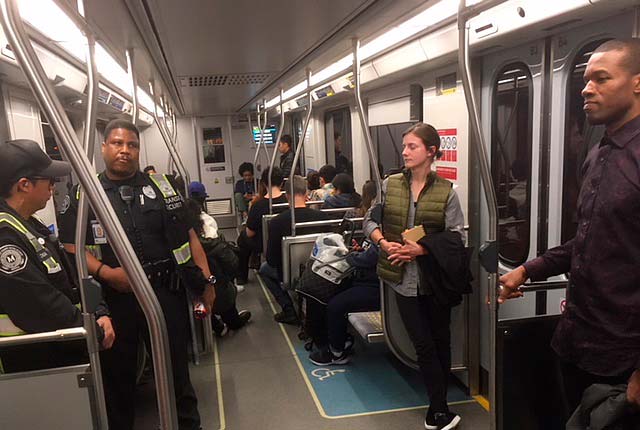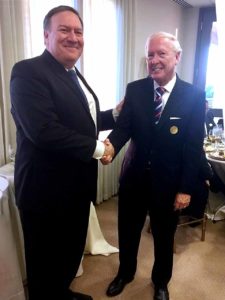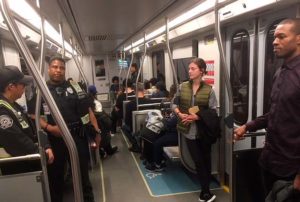



By Randolph Dobbs
It was the persecution of Baptist ministers in 18th-century Virginia that led to the First Amendment and the separation of church and state: “Congress shall make no law respecting an establishment of religion, or prohibiting the free exercise thereof.”
Mormons, Catholics, Jews and Muslims — all religions have suffered persecution at one time or another, and the interfaith arena is one that vigorously defends religious liberty.
Consequently, interfaith service is not an opportunity to convert others to one’s own faith tradition. Instead, interfaith service creates a social space where no one’s religion is more important than that of another and all are treated with equal respect.


It was through interfaith, for example, that we in the Los Angeles Baha’i community were able to secure statements from American Islamic organizations in defense of the Baha’is in Yemen, and it was through interfaith that we participated in events hosted by the U.S. State Department to defend human rights in Iran.
Assembling a summary of the community’s interfaith activity for this article quickly led to an examination of engagement with local, regional and national government and social service agencies on a wide variety of interests including immigration, the environment, affordable housing and homelessness, racism and diversity.
As was stated in 2009 on behalf of the Universal House of Justice, the global governing council of the Baha’i Faith, “Efforts to participate in the discourses of society … can occur at all levels of society, from the local to the international, through various types of interactions—from informal discussions on Internet forums and attendance at seminars, to the dissemination of statements and contact with government officials.”
The environment
Earlier, in 1957, Shoghi Effendi, Guardian of the Baha’i Faith, linked the preservation and reclamation of the earth’s resources with both the “protection of [the] physical world and [the] heritage [of] future generations.”
Interfaith organizations are careful to promote the environment with the understanding that it is part of God’s creation. Just as Baha’is cite excerpts from the Writings supporting our understanding of ecological issues, Christians likewise cite biblical excerpts that support the environment in Psalm 96: “Let the heavens rejoice, let the earth be glad, let the sea resound, and all that is in it; let the fields be jubilant, and everything in them. Then all the trees of the forest will sing for joy; they will sing before the Lord.”
Conservation is about sustainable use and management of natural resources. Preservation, by contrast, strives to preserve areas of interest in their natural state.
Two years ago, the Baha’i representative was invited to offer the invocation at the opening of the Stoneview Nature Center, a five-acre preservation park owned by Los Angeles County’s Parks and Recreation Department and located in the Baldwin Hills area of Los Angeles not too far from the Baha’i Center. The nature center features vegetation native to Southern California and also has an educational display that focuses on sustainability, mindfulness, health and the environment.
Along with the Prayer for America revealed by ‘Abdu’l-Baha, son of the Prophet-Founder of the Baha’i Faith, this quote from the Guardian in a 1933 letter was shared:
“We cannot segregate the human heart from the environment outside us and say that once one of these is reformed everything will be improved. Man is organic with the world. His inner life moulds the environment and is itself also deeply affected by it. The one acts upon the other and every abiding change in the life of man is the result of these mutual reactions.”
From that particular interfaith gathering, the Baha’is were invited to participate in the Baldwin Hills Community Advisory Panel. This group makes recommendations to the Board of Supervisors that has oversight over the Inglewood Oil Fields.
The Baldwin Hills area has been a site of oil and gas production dating back to the 1920s, when the area was largely undeveloped. The city literally grew up around the oil field. Today, passengers traveling by car on their way to or from Los Angeles International Airport pass through Baldwin Hills and can’t help but notice the oil field with its hundreds of pump-jack wells along La Cienega Boulevard, dipping their mechanical beaks to drink in petroleum.
It’s an energetic panorama that evokes expansion, industry and wealth. But it also masks the environmental dangers which are hidden in plain sight: soil and groundwater contamination, air pollution and oil spills. As a result, concerns have been raised about the potential conflict between oil and gas operations and the welfare of the surrounding residential communities.
Immigration
Interfaith activity has also brought engagement with local government in its efforts to support those who have immigrated to the United States from other countries — sometimes for humanitarian reasons but often out of economic necessity.
Los Angeles is a point of entry as well as a destination point for migrants and refugees. In January 2017, when the American government instituted a ban on foreign nationals entering the United States from seven Muslim-majority countries, the issue became a priority for local government and tailor-made for interfaith organizations.
Taking great care not to cite partisan positions, interfaith groups of every size and description advocated for due process and the protection of human rights guaranteed under articles 13 and 15 of the Universal Declaration of Human Rights, which was adopted by the United Nations in 1948 and championed by the American government.
In September 2017, the federal government rescinded DACA, the Deferred Action for Childhood Arrivals program. Working within an interfaith group connected to the Los Angeles Mayor’s Office, the Baha’i representative wrote a response statement ratified by the other member faith traditions that read in part:
“We the representatives of diverse faith traditions in the most religiously diverse city in the world offer the following thoughts in response to the looming termination of DACA, the Deferred Action for Childhood Arrivals program. As people of faith in partnership with the mayor’s office of community outreach, we stand at the intersection of the religious and the secular. On this point, faith is united with municipal government in a meaningful way because one’s sense of religious community transcends national borders.
“Los Angeles is a global city, home to the largest population of undocumented citizens in the country, but in a larger sense, every family is an immigrant family that came from somewhere else in the world. This simple fact makes us all descendants of ‘dreamer’ ancestors with aspirations of a better life for ourselves and our families.
“Just as we believe that all people have souls, so do we also believe that all people have rights. Enshrined in our nation’s constitution is the principle that all men are created equal, that they are endowed by their Creator with certain unalienable rights. We cannot now counter this truth by claiming that the privilege of American citizenship allows us to treat other people differently. Both things cannot be true. Freedom and privilege cannot be placed on opposite sides of the scale. Justice must prevail for everyone.”
On behalf of the Interfaith Coalition (although not attributed to the Baha’i Faith), the entire statement was hand-delivered by Los Angeles Mayor Eric Garcetti to both houses of Congress. It was a defining moment of faith in action and has since reverberated in multiple interfaith spaces.
It should also be understood that the traditional sense of immigration as a process of relocating from one country to another does not sufficiently reflect the complexity of dislocating cultural identity. The Baha’i perspective of global citizenship allows for flexibility in identifying solely with neither the nation of origin or adoption. “It is not for him to pride himself who loveth his own country, but rather for him who loveth the whole world,” Baha’u’llah wrote, as quoted in Gleanings from the Writings of Baha’u’llah.
Affordable housing, homelessness and racism
Each of these three subjects deserves its own space in this reflection, but together they conspire to create racial and ethnic segregation in conclaves throughout the city. Los Angeles is diverse, very diverse, but it is also divided.


Racism isn’t always overt, but African Americans are clearly overrepresented within the homeless population. The city is the homeless capital of America and interfaith organizations have been proactive in supporting solutions.
As a result, the Spiritual Assembly has supported legislative initiatives to redress the lack of affordable housing as well as other contributing factors to homelessness, including the lack of access to mental health care and treatment centers for drug and alcohol addiction, plus providing education and jobs-training to create economic opportunity.
Engagement with the interfaith community also includes fundraising and active service with Habitat for Humanity, the global nonprofit of Christian origin that builds and advocates for affordable housing for the working poor. This effort not only addresses the city’s housing shortage but also improves property values in neighborhoods where Habitat homes are either renovated or newly built.
Membership in Habitat for Humanity’s interfaith task force led to highly organized visits to the state legislature to advocate for new legislation promoting affordable housing. On one visit, the Baha’i representative joined other members of statewide Habitat affiliates for a total of 95 individual visits with legislators in a single day, all advocating for affordable housing for the working poor.
Advocacy is a growing area of social action in the Los Angeles Baha’i community. It has led to collaborative engagement with other organizations such as the National Council of Jewish Women (NCJW) and Move LA, the one an international organization of volunteers and advocates working for social justice, and the other a consortium of community partners promoting mass transit in the greater Los Angeles area and working closely with the Metropolitan Transit Authority (MTA). Basically, advocacy leavens the decision-making in areas of legislation and public policy.
“What is important is for Bahá’ís to be present in the many social spaces in which thinking and policies evolve on any one of a number of issues — on governance, the environment, climate change, the equality of men and women, human rights, to mention a few — so that they can, as occasions permit, offer generously, unconditionally and with utmost humility the teachings of the Faith and their experience in applying them as a contribution to the betterment of society.”
— Universal House of Justice, Department of Secretariat, Jan. 4, 2009
Randolph Dobbs is a member of the Spiritual Assembly of the Baha’is of Los Angeles, the local governing council for the Baha’i community, as well as the Regional Baha’i Council of the State of California. He also is a longtime Los Angeles Baha’i representative to interfaith organizations.


![]()
![]()
Whether you are exploring the Bahá'í Faith or looking to become an active member, there are various ways you can connect with our community.
Please ensure that all the Required Fields* are completed before submitting.